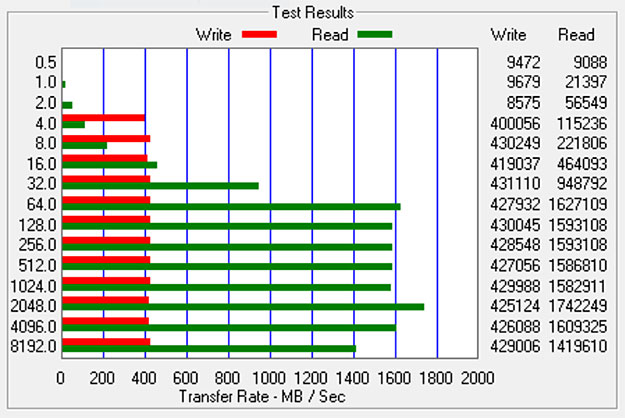Dell XPS 13 2-In-1 Review - Portable And Flexible Living On The Infinity Edge
XPS 13 SiSoft SANDRA, ATTO Disk and SunSpider Testing
We'll start here, in the same place as our recent Dell XPS 13 review, with SiSoftware's SANDRA 2016, or the System Analyzer, Diagnostic and Reporting Assistant. Our testing consists of four of SANDRA's built in subsystem benchmarks: Processor Arithmetic, Processor Multimedia, Physical Disks, and Memory Bandwidth. Then we'll take a quick peek at ATTO, which is a low level disk throughput benchmark that will give us a finer-grained look at the XPS 13 2-In-1's storage performance.
Sandra Memory and Storage Bandwidth


ATTO Disk Benchmark Read/Write Results
So, there are some interesting observations out of the gate here in our SANDRA numbers. For starters, the Core i7-7Y75 in our XPS 13 2-In-1 machine offers dramatically more Integer and floating point throughput than the other Core M class machines listed in the benchmark's database. In fact, it hangs with a few legacy standard Core i chips. Then, looking at memory bandwidth north of 22GB/sec, it becomes obvious this isn't your typical Core M system of the previous generation of devices.
In terms of its storage subsystem, the XPS 13 2-In-1 puts up over 1.6GB/sec for read IO bandwidth and a shade over 400MB/sec for writes. That's a little pokey on the write side of the equation. However, for the majority of this machine's target user base, the SK Hynix SSD on board should be up to the task of consumption and productivity chores, though content professional creation types might jones for a bit more bandwidth.
In terms of its storage subsystem, the XPS 13 2-In-1 puts up over 1.6GB/sec for read IO bandwidth and a shade over 400MB/sec for writes. That's a little pokey on the write side of the equation. However, for the majority of this machine's target user base, the SK Hynix SSD on board should be up to the task of consumption and productivity chores, though content professional creation types might jones for a bit more bandwidth.
|
Next, we have some light-duty Javascript processing tasks, which is typical of web browsing usage models. The Webkit Open Source Project suggest the following about the following SunSpider Javascript benchmark...
Unlike many widely available JavaScript benchmarks, this test is real-world with actual developer applications, balanced with different areas of the language and different code types and statistically sound, running each test multiple times to determine and average with error range and 95% confidence interval.


This is a classic example of where you'll find Kaby Lake-Y fully capable no matter what you throw at it. The bursty, lightly threaded nature of web browsing is a walk in the park for the Core i7-7Y75 chip on board the Dell XPS 13 2-In-1, so it scores near the top of the pack of our Kaby Lake machines at similar clock speeds. Intel Speed Shift technology allows a 4.5 Watt Kaby Lake-Y processor to spool up for this very kind of workload, and then quickly ramp back down when done for optimal power consumption.






